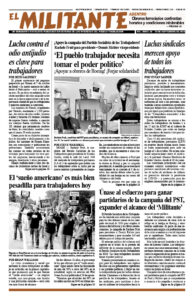October 4, 1999
VERNON, British Columbia — “The most significant thing that has been accomplished has been everything regarding affection and solidarity between us,” stated Alcides López, representative of the Cuban Ministry of Agriculture. López was part of a delegation of 27 Cuban farmers, scientists, engineers and officials who were on a 21-day tour of British Columbia’s farmland.
The tour was part of a Canada-Cuba farmer exchange program. Earlier this year, 20 farmers from British Columbia visited Cuba and toured the island’s farmland.
The agrarian reforms that were at the heart of the Cuban revolution and eliminated the class exploitation of working farmers make a big impression on family farmers here who find out about that example. Over the course of their tour, the Cubans met with 600 farmers and visited a total of 120 farms throughout the province.
October 4, 1974
More than 80 years ago Frederick Engels wrote, “The splitting up of society into a small class, immoderately rich, and a large class of wage-laborers devoid of all property, brings it about that this society smothers in its own superfluity, while the great majority of its members are scarcely, or not at all, protected from extreme want.
“This condition becomes every day more absurd and more unnecessary. It must be gotten rid of; it can be gotten rid of.”
His words were never more timely.
The land and factories that the people of the world depend on for life must be run in the interests of the vast majority of humanity.
The system of private ownership and private profit, of the exploitation of the weak by the strong, and of cutthroat competition, must be done away with.
What is needed is nothing less that the socialist reorganization of society.
October 3, 1949
Chiang Kai-shek’s representatives in the United Nations are making a bid for support from the capitalist world. But all this effort is in vain because the breakdown of Chiang’s regime is an accomplished fact. All this represents a tremendous setback for world imperialism, which has lost its main foothold and sphere of influence in continental Eastern Asia.
Washington is concentrating on the transformation of Japan into an anti-communist bulwark and offensive base for Asia. But Japan is hardly a barrier against the general movement of the Asiatic peoples.
The advance of the Stalinist armies in China has greatly increased the difficulties of the French imperialists in Indo-China and of the Dutch imperialists in Indonesia, where the effect of the imperialist debacle in China is to encourage the rebellious masses to drive out their own oppressors.

